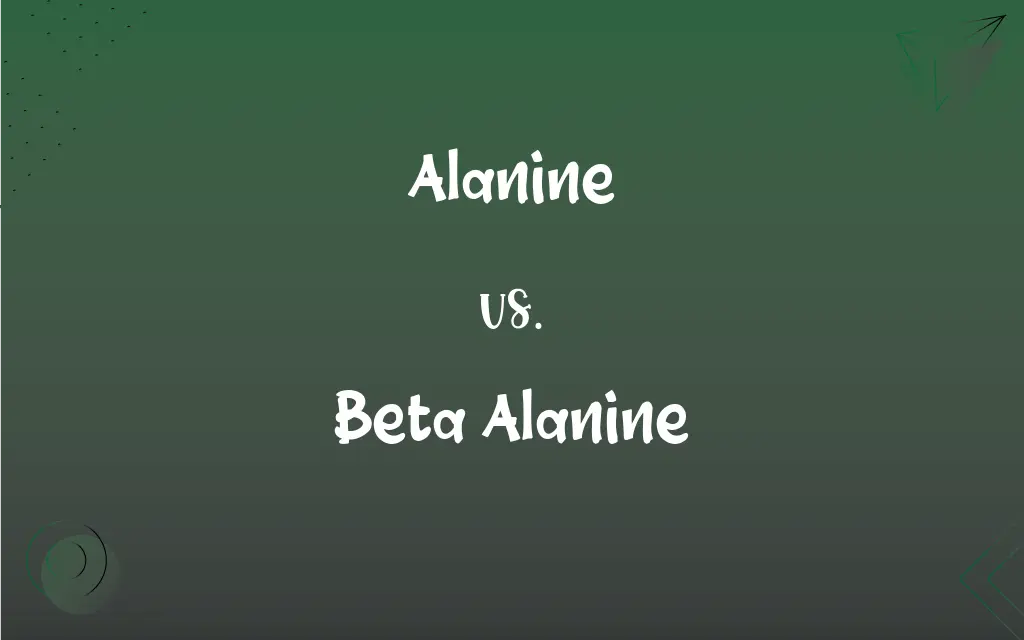Alanine vs. Beta Alanine: What's the Difference?
Edited by Aimie Carlson || By Harlon Moss || Published on January 8, 2024
Alanine is a standard amino acid in protein synthesis, while Beta Alanine is a non-standard amino acid not used in constructing proteins but important in muscle endurance.

Key Differences
Alanine is an α-amino acid used in the biosynthesis of proteins, playing a key role in glucose metabolism. Beta Alanine is a β-amino acid, not incorporated into proteins but crucial for synthesizing carnosine, a compound important for muscle endurance.
In Alanine, the amino group is attached to the α-carbon next to the carboxyl group. In Beta Alanine, the amino group is attached to the β-carbon, one carbon away from the α-carbon.
Alanine is significant in energy production and immune system function. Conversely, Beta Alanine acts as a buffering agent, reducing muscle acidity during high-intensity exercise.
The body uses Alanine to produce glucose and enzymes and for immune system support. Beta Alanine is primarily used in sports supplements to enhance muscle performance.
Alanine can be synthesized in the body and obtained from food sources like meat, poultry, and fish. Beta Alanine is not commonly found in high quantities in foods and is often supplemented for its muscle fatigue-reducing effects.
ADVERTISEMENT
Comparison Chart
Type of Amino Acid
α-Amino Acid
β-Amino Acid
Role in Proteins
Used in protein synthesis
Not used in proteins
Position of Amino Group
Attached to α-carbon
Attached to β-carbon
Primary Function
Energy production, immune support
Buffering agent, reduces muscle fatigue
Dietary Sources
Meat, poultry, fish
Low in foods, often supplemented
ADVERTISEMENT
Alanine and Beta Alanine Definitions
Alanine
A key player in glucose metabolism.
Alanine helps convert glucose into energy during intense workouts.
Beta Alanine
Not commonly found in dietary sources.
Athletes often take beta alanine supplements due to its scarcity in food.
Alanine
An amino acid involved in immune system function.
Adequate alanine levels are important for maintaining a healthy immune response.
Beta Alanine
Acts as a buffering agent in muscles.
Beta alanine helps reduce lactic acid buildup in muscles.
Alanine
Synthesized in the body and found in various food sources.
Chicken breast is a rich source of alanine.
Beta Alanine
Enhances muscular endurance.
Beta alanine supplementation is popular among sprinters for its endurance benefits.
Alanine
Plays a role in enzyme production.
Alanine is integral to the synthesis of various enzymes in the body.
Beta Alanine
Increases muscle carnosine levels.
Supplementing with beta alanine can delay muscle fatigue during exercise.
Alanine
An α-amino acid used in protein synthesis.
Alanine is an important component in the structure of many proteins.
Beta Alanine
A non-proteinogenic β-amino acid.
Beta alanine is often used in sports supplements to enhance performance.
Alanine
A nonessential amino acid, C3H7NO2, that is a constituent of many proteins.
Alanine
A nonessential amino acid 2-aminopropanoic acid found in most animal proteins
Potatoes can be a good source of alanine.
Alanine
(countable) A specific residue, molecule, or isomer of this amino acid
Two alanines are replaced by prolines.
Alanine
One of the natural amino acids found combined in the proteins of most living tissues. It can be isolated as a white crystalline base, C3H7NO2. The natural form is the L-configuration.
Alanine
A crystalline amino acid that occurs in many proteins
FAQs
What is Beta Alanine?
Beta Alanine is a β-amino acid important in muscle endurance and buffering lactic acid.
What is the role of Beta Alanine in muscles?
Beta Alanine increases carnosine levels, reducing muscle fatigue and acidity.
What is Alanine?
Alanine is an α-amino acid used in protein synthesis and energy production.
How does Alanine function in the body?
Alanine aids in glucose metabolism and supports the immune system.
Can Alanine be synthesized in the body?
Yes, the body can produce Alanine.
What foods are rich in Alanine?
Meat, poultry, and fish are good sources of Alanine.
How do athletes use Beta Alanine?
Athletes supplement with Beta Alanine for improved muscle performance and endurance.
Is Beta Alanine a standard part of proteins?
No, Beta Alanine is not incorporated into proteins.
What distinguishes Beta Alanine from other amino acids?
Its position as a β-amino acid and its role in muscle endurance.
How does Beta Alanine affect muscle acidity?
It acts as a buffer, reducing acidity and delaying fatigue.
Does Alanine support enzyme production?
Yes, Alanine is involved in the synthesis of various enzymes.
Is Alanine important for glucose production?
Yes, Alanine plays a crucial role in gluconeogenesis.
Are there any side effects of Beta Alanine supplementation?
Some may experience tingling sensations, a harmless side effect known as paresthesia.
Why isn't Beta Alanine found in many foods?
Its role in the body is specific and not directly linked to dietary sources.
Does the body store excess Alanine?
Alanine is not stored in large quantities; excess is converted to glucose or other metabolites.
Can vegetarians get enough Alanine?
Yes, but they may need to consume a variety of plant-based proteins.
Does Alanine help in workouts?
Indirectly, as it's involved in energy production.
Can Beta Alanine improve sprint performance?
Yes, it's known to enhance short-duration, high-intensity athletic performance.
Is Alanine supplementation necessary?
Usually not, as it's adequately obtained from a balanced diet.
What's the best way to take Beta Alanine?
Through supplements, as per recommended dosages for athletic performance.
About Author
Written by
Harlon MossHarlon is a seasoned quality moderator and accomplished content writer for Difference Wiki. An alumnus of the prestigious University of California, he earned his degree in Computer Science. Leveraging his academic background, Harlon brings a meticulous and informed perspective to his work, ensuring content accuracy and excellence.
Edited by
Aimie CarlsonAimie Carlson, holding a master's degree in English literature, is a fervent English language enthusiast. She lends her writing talents to Difference Wiki, a prominent website that specializes in comparisons, offering readers insightful analyses that both captivate and inform.






































































